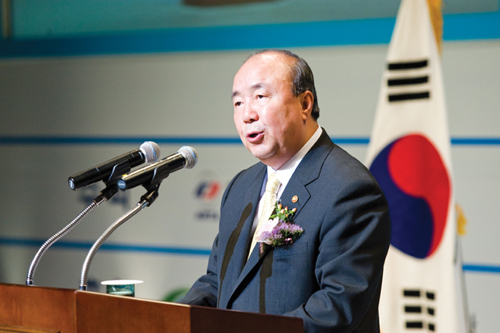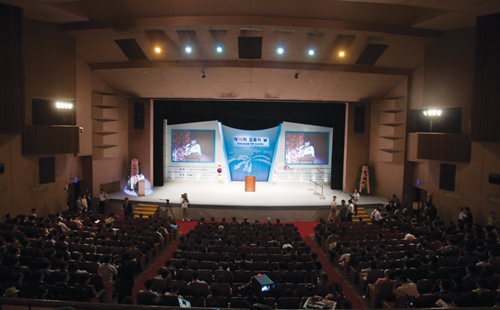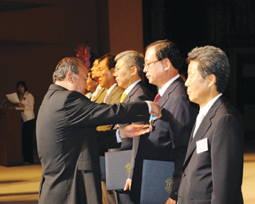Road Policies Key On Green Growth
Roads, tunnels and bridges to be environmentally friendly
 The 18th Road Day ceremony on July 7 attracted over 1,000 people to the Seoul Education Culture Hall including high-ranking government officials, legislators and leaders in the construction industry to commemorate the 39th anniversary of the opening of the Seoul-Busan Highway on July 7, 1970.
The 18th Road Day ceremony on July 7 attracted over 1,000 people to the Seoul Education Culture Hall including high-ranking government officials, legislators and leaders in the construction industry to commemorate the 39th anniversary of the opening of the Seoul-Busan Highway on July 7, 1970.
Minister Chung Jong-hwan of the Ministry of Land, Transport and Maritime Affairs, in his congratulatory speech, said the necessity for turning the transportation system around to a sustainable, environmentally friendly green system is growing greater.
He called on the people in the construction industry to have passion, a challenging spirit and creativity to achieve the changes necessary in the transport system to an environmentally friendly one in the future.
Various policies for roads and highways will be changed by the target year 2020. Since the opening of the Seoul-Busan Highway in 1970, a total of 140 trillion won has been saved in logistics costs.
Minister Chung said the government has already been in the middle of pushing various services connected with roads and highways to benefit the people's livelihood, economic activities and comprehensive traffic by changing the transport system to a more sustainable one.
He said the government has been promoting the expansion of outer circulatory roads around large cities to solve heavy traffic congestion on roads.
The minister said all policies on roads and highways will be in tune with the government's green growth policies whose aims are to make roads more convenient to the people by designing them in harmony with nature as part of a sustainable road traffic system, connecting beautiful roads with culture and history.
The roads will be made intelligent with the application of information technologies. There will also be outer circulatory roads to reduce the concentration of CO2 exhaust fumes from cars, roads to solve heavy traffic congestion and roads for bicycles, an environmentally friendly means of transport, as part of the green transportation system envisioned by the government.
Chairman Lieu Chull-ho of the Korea Road and Traffic Association, the host of the Road Day event, said in his opening speech that Road Day is an occasion to remember the hard work and passion put in by all road and traffic people in the country who devoted themselves to the modernization of their motherland.
Lieu said today Korea has 27 national highways covering over 3,500 km and some 100,800 km of general roads and they have been backing up the growth of the national economy to rank 13th in the world in terms of GDP.

The KRTA chairman said through continued development of new road construction technologies and finding new materials with the application of IT, Korea's road construction mixed with high-tech traffic technologies have made astounding progress and a substantial advancement into the international construction market.
Also, many road construction experts from Korea have occupied high positions in construction organizations overseas including chairman of the Asia-Oceania Road Technology Association and a member of the World Road Association, among others.
Lieu announced that the 3rd International Road and Traffic Expo 2009 will take place in Seoul in September at which some 3,500 road experts and government officials in charge of road policies from 113 countries are expected to participate along with some 350 domestic makers of equipment and products related to roads. They will include cabinet-level officials from 20 countries and 60 heads of road-related organizations from 50 countries in an effort to expand cooperation and share new technologies for road construction. The event will hold an academic conference on 14 professional areas and over 400 papers from 25 countries have already been accepted, the chairman said.
The international event is likely to draw some 30,000 spectators, the chairman said, creating 50 billion won worth of production value and 12 billion won of value-added portion.
Also to be held in Incheon are the REAAA and PIARC. The first one is for Asia and Oceania and the second is for Europe. This will be the first time that the two international road and traffic events will be held at the same time and the same place, the KRTA chairman said.
The Seoul event will provide an opportunity to upgrade the technologies for roads and traffic over national borders. The road and traffic expo will bring many experts from Europe and help Korean construction firms strengthen their international competitiveness and thus be able to expand their advances into the international road construction market.
At the expo, many road and traffic related commodities will be displayed, including the technologies for road construction and the maintenance of roads, especially those related to road safety, high-tech traffic control systems and parking systems. There will also be a model traffic safety system to show the viewers what the system means to their daily lives, especially children and their parents, the KRTA chairman said.
Lieu said the KRTA has been following its policies for building roads around nature preserve areas, making hilly areas green and applying measures to build bridges and tunnels that reduce the damage to nature.
The Korea Expressway Corp. is in the middle of developing technologies related to covering highways and roads with environmentally friendly material that has a long life and a manual for designing landscapes along highways, along with the construction of smart highways to expedite the arrival of a time when intelligent highways will be built using a mix of IT, next-generation automobile production technologies and high-tech road construction technologies, the KRTA chairman predicted. Lieu is also chairman of the KEC.
The road and traffic organizations around the world are busy finding new material for road pavement due to global warming, new road design technology and intelligent road systems with a huge allocation of research funds. Pavement materials for roads absorb solar heat and reflect it, producing its own heat in the process and thus has an impact on heat created by cities, the reduction of green areas and air pollution, the chairman said.
This is why Korea and advanced countries have been searching for new materials with which to pave roads. The goal is to keep the road surface at a temperature of around 22 degrees Celsius, even if they have to stop using asphalt and cement as paving materials, Lieu said.
The main theme of the REAAA conference will be "Future Roads: Safer, Greener and Smarter."Many topics on various problems related to roads and traffic will be discussed. A number of papers on the safety of roads, making roads environmentally friendly and research on the development of technologies for building intelligent roads will be presented at the event. The conference will have academic sub-meetings on 14 different areas of roads and traffic during its four-day run. nw
Minister Chung Jong-hwan of the Ministry of Land, Transport and Maritime Affairs delivers a speech at the 18th Road Day ceremony on July 7 held at the Seoul Education Culture Hall in Seoul.
A view of the ceremony for the 18th Road Day held on July 7 at Seoul Education Culture Hall in Seoul.
Minister Chung pins medals on the winners of medals for their contributions to the road construction industry during their careers on the Road Day.
3Fl, 292-47, Shindang 6-dong, Chung-gu, Seoul, Korea 100-456
Tel : 82-2-2235-6114 / Fax : 82-2-2235-0799